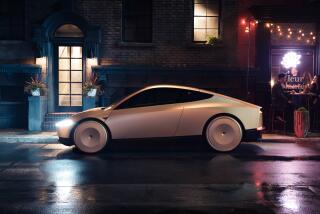Teslaâs first-quarter net income tumbles 55% as falling global sales and price cuts reduce profits

Teslaâs first-quarter net income plummeted 55% as falling global sales and price cuts sliced into the electric vehicle makerâs revenue and profit margins.
The Austin, Texas, company said it made $1.13 billion from January through March compared with $2.51 billion in the same period a year ago.
Revenue was $21.3 billion, down 9% from last year as worldwide sales dropped nearly 9% due to increased competition and slowing demand for electric vehicles. Tesla also blamed an arson attack at its German plant and factory downtime as it switched factories to an updated version of the Model 3 sedan.
Excluding one-time items such as stock-based compensation, Tesla made 45 cents per share, falling short of analyst estimates of 49 cents, according to FactSet.
The companyâs gross profit margin, the percentage of revenue it gets to keep after expenses, fell once again to 17.4%. A year ago it was 19.3%, and it peaked at 29.1% in the first quarter of 2022.
Tesla said in a letter to investors Tuesday that its vehicle sales growth âmay be notably lowerâ than last year as it works on the launch of its next-generation vehicle and unidentified other products.
The next-generation vehicle apparently is the small Model 2, which is expected to cost around $25,000 and give Tesla more appeal to mass-market buyers. It wasnât clear whether the company would continue to pursue that car.
The company also appears to be counting on a vehicle built to be a fully autonomous robotaxi as the catalyst for future earnings growth. Chief Executive Elon Musk has said the robotaxi will be unveiled Aug. 8.
Shares of Tesla rose 5.2% in trading after Tuesdayâs closing bell, but they are down more than 40% this year. The S&P 500 index is up about 5%.
Investors and analysts will be looking for more specific answers from Musk on an earnings conference call later Tuesday. Many analysts say the sales decline raises questions about demand for Teslas and other electric vehicles.
Musk has been touting the robotaxi as a growth catalyst for Tesla since the hardware for it went on sale late in 2015. He has called the system âFull Self Driving,â even though the company says on its website that it canât drive itself and humans must be ready to take control at all times.
In 2019, Musk promised a fleet of autonomous robotaxis by 2020 that would bring income to Tesla owners and make their car values appreciate. Instead, theyâve declined with price cuts, as the autonomous robotaxis have been delayed year after year while being tested by owners as the company gathers road data for its computers.
Industry analysts are skeptical and feared that Musk had canceled or delayed plans for the Model 2.
Over the weekend, Tesla lopped $2,000 off the price of the Models Y, S and X in the U.S. and reportedly made cuts in other countries including China. It also slashed the cost of âFull Self Drivingâ by one-third to $8,000.
In a note to investors Monday, Bank of America global research analyst John Murphy wrote that Teslaâs shares have been under pressure since the start of the year due to weaker EV sales and production that exceeds demand.
âWe retain some level of skepticism on Teslaâs growth prospects, but also see opportunities as the company will unveil future growth drivers (robotaxi and Model 2) in the coming months,â Murphy wrote, adding that he maintains a neutral rating on the stock.
On Sunday, Musk wrote on X, the social media platform he owns, that like other automakers, Tesla prices change frequently âin order to match production with demand.â
From January through March, Tesla manufactured 433,371 vehicles and delivered 386,810, making over 46,000 more than it sold. This even after it cut prices last year on some of its more expensive models by up to $20,000.
Last week Tesla announced it would cut 10% of its 140,000 employees, and key executive Andrew Baglino, senior vice president of powertrain and energy engineering, announced he was leaving after 18 years. The company also announced that it would ask shareholders to restore a $56-billion pay package for Musk that was rejected by a Delaware court.
Murphy wrote that on Tuesday he expected Musk and the company to give some hints about the robotaxi and might also reiterate an intent to start making the Model 2 in 2025 or 2026.
For years, Musk has told owners and investors that Teslas with âFull Self Drivingâ software and hardware will be able to drive themselves and could earn money carrying passengers when they normally would have been parked.
But âFull Self Drivingâ thus far has not been anything other than a partially automated driver assist system that canât drive itself.
Early last year the National Highway Traffic Safety Administration made Tesla recall its âFull Self-Drivingâ system because it can misbehave around intersections and doesnât always follow speed limits. Teslaâs less-sophisticated Autopilot driver monitoring system also was recalled.
Some experts donât think any system that relies solely on cameras like Teslaâs can ever reach full autonomy.
Krisher writes for the Associated Press
More to Read
Inside the business of entertainment
The Wide Shot brings you news, analysis and insights on everything from streaming wars to production â and what it all means for the future.
You may occasionally receive promotional content from the Los Angeles Times.










